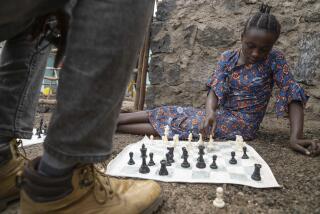Their hobby is of a piece
- Share via
Every Friday night, a group of noisy youngsters shuffles through a side door at First Baptist Church of Glendale. They laugh, shove and talk over one another as they enter a large, brightly lighted room with three long tables.
Inside, silver-haired Armen Ambartsoumian waits for them to settle down so the session can begin. Ambartsoumian, an international chess master who is determined to groom Glendale’s next generation of elite players, demands their focus. This can be a chore when dealing with more than two dozen kids ages 5 to 18.
Once the players unpack their black-and-white boards and chess pieces, Ambartsoumian instructs them to pair up and play. Then he paces the aisles between the tables, one hand on his hip, the other pointing out mistakes.
“I’ve told you,” he reminds one, “always save your king.”
For Ambartsoumian, this is more than a game that teaches logical thinking, problem-solving and the ability to anticipate your opponent’s next move. It’s a part of the culture of Armenia that has extended to Glendale, where one third of the city’s 200,000 residents are of Armenian descent.
Chess’ popularity in Armenia began in 1963 when Tigran Petrosian defeated Mikhail Botvinnik, an elite Soviet player, for the world title. Petrosian won five more titles over the next six years, becoming more than just a role model in Soviet-dominated Armenia.
“He was [our] hero,” Ambartsoumian said. “I belong to that generation.”
At age 6, Ambartsoumian visited his first chess club. At 12, he joined the Armenian youth team, and even contested -- and lost -- three matches against a young Garry Kasparov, considered one of game’s greatest players.
“He was like a machine,” Ambartsoumian remembers. “After the match, he was pointing out moves I hadn’t even seen.”
Ambartsoumian has been coaching since 1983 after studying the game at Moscow’s famed Institute of Physical Culture. In 1991, he was named the first head coach of the Armenian national team, a position akin to managing the New York Yankees.
He moved to Glendale in 1998 and spent a decade with the AAA Chess Academy, founded by another Armenian immigrant. But he left this past year to start the American Chess Academy.
With Andranik Matikozian, a three-time California state champion, Ambartsoumian now coaches more than 100 students. He teaches nearly every day of the week either in class or private sessions, and sometimes even online with students on the East Coast.
In his class at the Glendale church, Ambartsoumian hands out puzzles -- diagrams of chess moves that students must solve -- and assigns homework. He divides the class into teams and uses a large chess board to illustrate strategies.
Brendyn Estolas started playing under Ambartsoumian when he was 5. His chess rating was zero. Now, at 13, his rating is 1,700. The rating for experts is 2,000.
“He’s a really good teacher,” said Brendyn, whose sister, Ruby, 6, started playing under Ambartsoumian in January and won her first tournament in Santa Clarita six months later. “He just has fun.”
Some of Ambartsoumian’s players have gone on to compete successfully in international tournaments. Tatev Abrahamyan, 21, a former student, is ranked the No. 8 U.S. female player by the World Chess Federation.
“So many people wish we could clone him,” said Sue Gunawan of Arcadia, whose son, Cheston, 14, is one of Ambartsoumian’s star players. “Someone even said, name your price. For him, it’s not about the money. It’s about the kid and the parent.”
Ambartsoumian, 48, admits he has received lucrative offers from celebrities to teach their children, but he often declines. “I don’t want to go be a baby-sitter,” he said.
Although winning is important, Ambartsoumian said his main mission is to help his students become successful in all facets of life.
“People I was teaching for years, they’re now in university,” he said. “When parents tell me, ‘Thank you, Armen, my son is doing so good,’ this is important for me. I feel like I helped these guys.”
--
More to Read
Go beyond the scoreboard
Get the latest on L.A.'s teams in the daily Sports Report newsletter.
You may occasionally receive promotional content from the Los Angeles Times.










